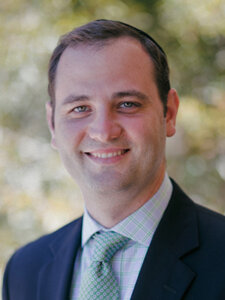Donald Trump’s Hidden Opportunity for Jews

Graphic by Angelie Zaslavsky
Religious discrimination is wrong — a simple statement; and yet despite its simplicity, discrimination against Muslims in the United States is becoming increasingly acceptable.
Presidential candidate Donald Trump recently called for a “total and complete shutdown of Muslims entering the United States.” The statement itself has, thankfully, elicited condemnations from individuals and organizations across the political spectrum. To impose a religious test on immigration policy would take the United States back to far darker periods in our national history. And the overall response to Trump’s statement seems to reflect the outrage and horror that such a statement ought to generate.
But the unfortunate reality is that Trump’s statement is merely a reflection of a much more pervasive problem in the United States. What makes statements like Trump’s possible is that our society is becoming way more accepting of systemic anti-Muslim discrimination. According to FBI statistics, the number of annual anti-Muslim hate crimes has increased by about 500% — with the number of 2014 hate crimes against Muslims increasing 14% over the 2013 total. Maybe even more disturbing is that, according to a recent study, Muslims are nearly 50% less likely than other religious minorities to succeed on a religious liberty claim in court. And the legal environment is becoming even more inhospitable to Muslims, as eight states have enacted anti-Sharia laws, which fail to accomplish any discernible objective beyond adding to an already toxic public discussion that disparages Muslim Americans.
The fact that this state of affairs persists in the United States is unconscionable. And attempts to steer the conversation into broader questions of security policy or international politics serve only to further obscure how hateful rhetoric leads to hateful crimes.
In this way, the public scrutiny brought to bear on Trump’s recent comments presents an opportunity — an opportunity to evaluate how the United States treats its most vulnerable religious minorities. And few communities should be more engaged and outspoken about religious discrimination than the American Jewish community. More than most, the Jewish community knows all too well how frenzied rhetoric can change public perception, undermining personal safety and security. Many Muslim Americans now worry about walking in the streets while wearing traditional Islamic garb like the hijab — a fear deeply familiar to many Jews who refrain from wearing yarmulkes in societies where anti-Semitism remains part of public life. Such fears should not be allowed to persist in the United States.
Thankfully, many key Jewish organizations in the United States have been vocal in response to Trump, declaring that religious discrimination is unacceptable here in the United States. For example, Jonathan Greenblatt, CEO and national director of the Anti-Defamation League, fired off this statement in response to Trump’s comments: “In the Jewish community, we know all too well what can happen when a particular religious group is singled out for stereotyping and scapegoating. We also know that this country must not give into fear by turning its back on its fundamental values, even at a time of great crisis. As we have said so many times, to do otherwise signals to the terrorists that they are winning the battle against democracy and freedom.”
Similarly, in a joint statement, the Union of Orthodox Jewish Congregations of America and the Rabbinical Council of America “call[ed] on all Americans to reaffirm that discrimination of any group solely upon religion is wrong and anathema to the great traditions of religious and personal freedoms upon which this country was founded.” Joining in the collective condemnation of religious discrimination were other groups, including the American Jewish Committee and the Religious Action Center of Reform Judaism.
These statements are a good first step. But Trump’s policy statements are the tip of the iceberg. In the long run, religious communities need to provide each other with mutual support in fending off religious discrimination. That means using statements like Trump’s as a springboard to undo systemic forms of religious discrimination — discrimination that leads to everything from hate crimes to judicial bias. The Jewish community must work against intimidation at mosques, against laws that target individuals solely because of their Muslim faith and, maybe most important, to counteract an increasingly hostile environment in the United States that makes many people nervous about publicly identifying as Muslim. It is one of this country’s bedrock principles that every individual should be free to believe in whatever faith he or she chooses without fear of reprisal or intimidation.
But maybe the most valuable way to respond is for all of us to talk to our children. With the ubiquity of news, children have surely heard a lot — likely far more than we think — about Muslims, immigration and terrorism. And what they’ve heard is probably not pretty. If we are to truly put a stop to systemic discrimination, then we must start by making sure that we’ve imparted our core values to our children, especially with all the contrary messages swirling around them. People must not be persecuted for what they believe, and the Jewish community must make sure that the next generation fully appreciates how that message applies not only to our own interests, but also to the wide range of religious minorities that find themselves under the thumb of increasingly frightening majoritarian politics.
It is, of course, true that political disagreements have put a strain on the relationship between the American Muslim and American Jewish communities. But communities need not agree on everything to fight insidious forms of discrimination here in the United States. Maybe in this way, Trump’s declaration can actually bring about some good in this world.
Michael A. Helfand is an associate professor at Pepperdine University School of Law and associate director of the Diane and Guilford Glazer Institute for Jewish Studies.





















